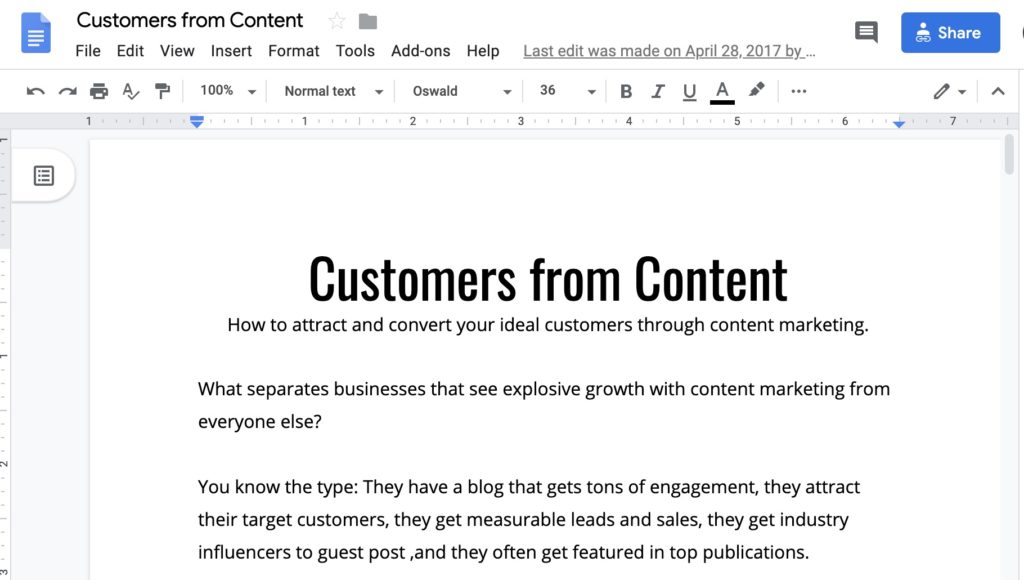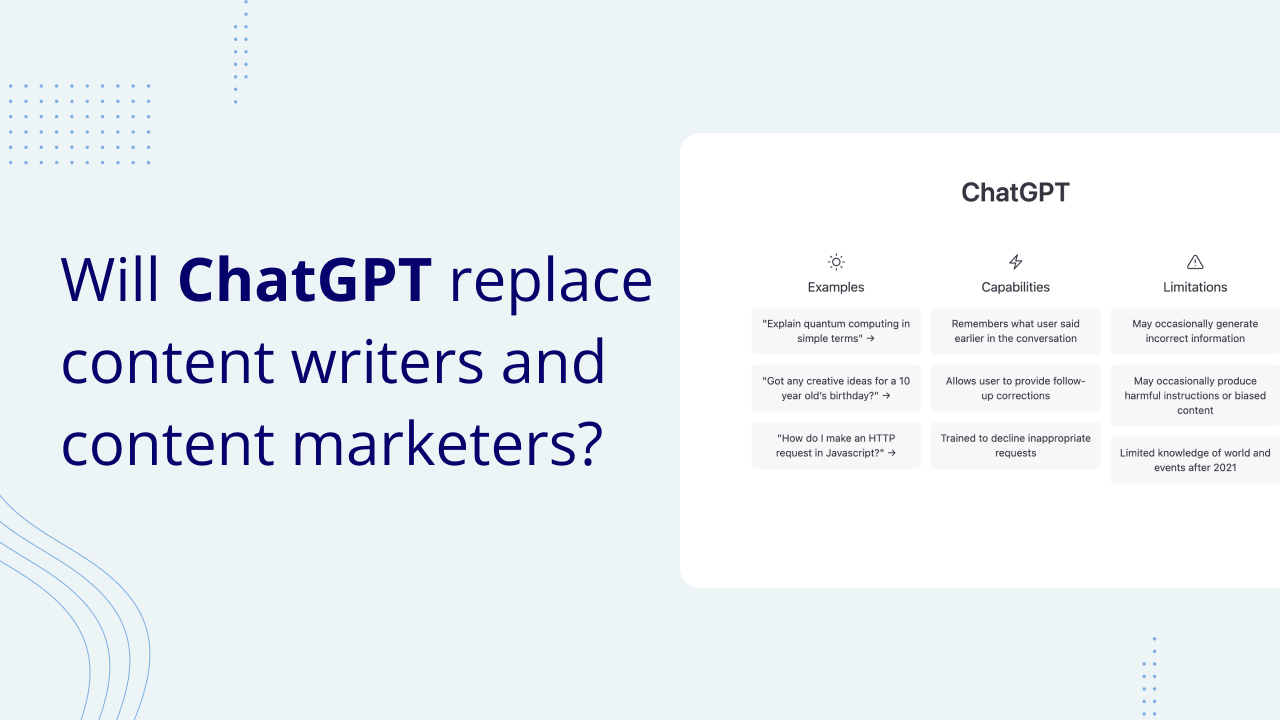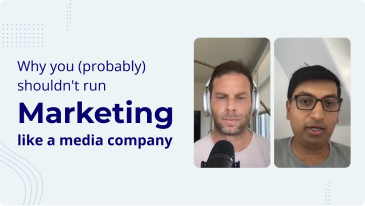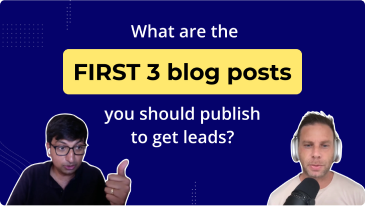We often get asked the question, “When doesn’t content marketing work for your clients?”
Devesh and I have been thinking about this question a lot lately and having looked back through all of the clients that were challenging to work with (or didn’t lead to successful outcomes), the common theme is that they’re always early stage companies.
We define early stage companies as:
- They haven’t proven that they can market and sell through at least one cold channel
- Their positioning/messaging is still being worked out
We won’t be working with companies that fit that criteria going forward.
The problem with working with early stage companies is that our agency value proposition is tied to helping the company drive leads and revenue, and if a company hasn’t figured the fundamentals like how to market and sell to a cold audience and their positioning and messaging, then all of the traffic in the world coming from the right audience won’t solve those problems.
This is not to say that early stage companies shouldn’t invest in content marketing though — In fact, I think quite the opposite. I think that content marketing can be a huge competitive advantage early on. I’ll explain more on this in a bit.
Where the misalignment comes from though is that oftentimes marketers and founders think that the reason people aren’t purchasing their product or service is because “they just haven’t gotten enough eyeballs on their site yet.”
They chase more and more traffic, they obsess over every detail of every article, they focus on the wrong metrics, and when people don’t purchase, they claim “content marketing doesn’t work for us.”
However, the reality is that content marketing is like any other marketing channel, if you’re executing on the channel properly, a lack of conversions typically signals a product/market fit issue or a positioning issue.
Good, even great marketing, won’t fix your product issue or company issue. It’ll only reveal a problem that needs to be solved. If you’re driving a ton of traffic to your website from the right audience and it’s not converting, it’s usually a signal of a larger issue at play. Once that issue is solved, then content marketing should be a channel that can scale overtime.
In this article, I’m going to share our own experience and learnings building an audience before we built a product/service and I’ll also share our philosophy about how other companies should think about content marketing as a channel at an early stage.
Note: If you’d like to learn the same content marketing strategy and process that we use for our clients, we share everything that we do behind the scenes in our course and community– all taught through written and video case studies. Learn more about our course here.
Our story: Building an audience first and learning about product/market fit and positioning the hard way
We started this site before we ever had a product to sell. The goal when we started was to educate people on some of our content marketing learnings and build an audience of people that were also interested in learning content marketing.
We grew our site to over 24,000 monthly readers in a matter of ~6 months and then we started testing various products to sell to them: a phone course, an in-person workshop and lastly an online course. Each iteration of our product had varying levels of conversions – the phone course sold out, the in-person workshop sold a couple and first course we launched sold a total of 9 seats (off an email list with thousands of people on it and a site that got more than 10,000 visitors a month, so not a great number).

But here is a critical point: The lack of conversions wasn’t a function of the content marketing not working.
We had traffic and we had the right audience on our site (marketers inside of companies looking to learn for themselves or improve their company’s content marketing results). What we didn’t have is a product people wanted.
So we went back to the drawing board and ended up pivoting our business to the content marketing agency you know of today and it quickly grew to $34k/month in revenue 4 months after the launch.
In the first 2 weeks, we closed 2 deals, worth $12,000/month in recurring revenue. In the first month and a half we got 29 leads. Within 4 months we had $34,000/month business.

We got these results all from content. We did not change a thing about our “content strategy”. We didn’t change what topics we wrote about. We didn’t change the conversion mechanism on our site. We didn’t try to increase traffic. The conversions were a function of finally having a product people wanted and the right positioning to sell it to them.
Here’s the craziest part: Once we had nailed product market fit, the content marketing that “wasn’t working” (generating revenue), now became an unfair advantage in terms of generating leads. We now have a website that brings us consistent leads from content alone. We don’t do any other marketing to drive business.
A client story: Great product, but selling it to a cold audience was unproven
We recently worked with a company that grew a pretty substantial business off of referrals (multiple millions in revenue). The main way they drove business is through their personal network and through word of mouth by people in their industry.
They were looking to scale their business beyond just their personal network referrals and were looking to move to an inbound driven business. We started to grow their traffic, and while it was driving visitors to their website, none of them were converting to paid signups.
In fact, after digging in a little deeper, we realized something that, in hindsight, we should have noticed before signing a contract: little (if any) of their cold site traffic was converting. It’s not to say that their product wasn’t great, because it was. I’m a huge believer in what they’re doing. But they hadn’t figured out the right way to position and sell their business to a cold audience.
We ended up having to end the relationship because there wasn’t enough ROI from content. And frankly, we weren’t offended, that was the correct thing to do. If you’re ever in this situation where your site isn’t generating leads or paid conversions, ask yourself this question: Have you proven the ability to sell your product or service to cold audiences?
People often make the assumption that just because you’re making sales through referrals that you’ll be able to make sales at the same rate when selling to a cold audience through your website (and that’s not true from my experience). When you sell through referrals, someone is doing a lot of the vouching for you and explaining the value of the product/service. Whereas when you’re selling through inbound, you need to make sure your website messaging communicates that value in the same way.
What do we define as selling to a cold audience? Basically selling to an audience that has never heard of your product or service before and that isn’t introduced through a connection to the company. It can be:
- Inbound from content
- Paid channels
- Outbound sales (email and phone)
Yes, outbound sales even counts because you’re still calling (or emailing) someone who doesn’t know you or wasn’t introduced to you, giving a pitch, and seeing if you can close them. That means you’re testing if your positioning can close cold people, i.e. strangers.
And this is the key point in this lesson: positioning and messaging that can close warm people is not always guaranteed to close cold people. It can be hard to accept that that’s true, but we’ve seen it time and again.
Finally, before we get angry comments about “but referrals are the best source of leads”, we should state that yes, they are, and there’s nothing wrong with growing a business strictly on referrals. Like we said the client in this example grew a multi million dollar business off of an extended network of referrals and warm intros. All we’re saying is that if you want to expand into cold audience channels and it doesn’t “work” at first try, be careful not to blame the wrong thing.
So should early stage companies do content marketing at all?
Yes! Just make sure to approach the channel with realistic goals. You can’t assume you’re going to start getting a massive number (or any number) of conversions until you’ve figured out product/market fit and your positioning, and you’ve proven that you can sell to a cold audience.
If you haven’t done that yet, just approach the channel with the mindset that you’re investing in a long-term asset.
While it might not drive conversions in the short term, the traffic is still valuable to you and will help you as you work through various iterations of your product/service and messaging. Once you figure out those core pieces of your business, then the investment that you worked towards upfront will pay off down the road just like it did for us.
Word of Warning: Be Careful Delegating Content Marketing to an Agency if You’re Early Stage
Although we definitely think early stage companies should do content marketing, you should be really careful about delegating it (to freelancers or agencies). Specifically, be prepared to feel like you have to edit, edit, and edit some more.
You may feel like “Why can’t they get it right?!”. But the reality is, it’s not them, it’s you.
Because of everything we talked about above in terms of your positioning and messaging not being well defined at the early stage, the reality is you yourself aren’t clear on the subtleties of messaging and positioning. So anything the outside party writes is going to feel like it needs work.
This has been especially pronounced for early stage companies that have a product that:
- Has multiple different benefits or value propositions
- Has multiple different audiences it can be used for
In those scenarios, which features to mention, which benefits to highlight, which value propositions to focus on, end up getting debated endlessly for every piece of content.
In the most extreme scenarios we’ve had trouble even agreeing on the content topics. We’ve gone back and forth on what topics to write about because we couldn’t agree on what kind of customers/features/pain points they wanted to attract.
We’ve also seen this for companies that established themselves in one space but are pivoting to another market (most commonly, moving “upmarket” to bigger firms they think will resonate with the same value proposition as their existing, smaller sized, customers. Spoiler: They won’t. Bigger companies have different challenges.).
But this has never been a problem with companies that have established sales channels and proven ability to sell to cold audiences. And that makes sense, because for them, they know which pitch works, they just want content to bring them more customers to present that pitch to. That’s the time to hire a content agency or scale content marketing as a growth channel.
Resources to help you get started
I’ve had a few people reach out to me recently who are at this stage looking for help, so here’s the advice that I’d give them.
Make sure to do extensive customer research before starting to produce content — our post on customer-content fit shares our process for doing this.
Don’t hire freelance writers with the expectation that you’ll be able to give them a topic to write about and the blog post will come back just the way you want it. When you hire writers without subject matter expertise to write on a topic for a customer who has been in the industry for years, the customer can tell and instead of building trust, it turns the customer away. Instead, think of writers as journalists who can produce marketing content. Have them interview people inside of your company or experts in the field on specific topics, and have them turn those interviews into articles that share your expertise on a topic.
We believe in focusing on topics that have purchase intent first and working your way up the funnel. This will help you quickly determine if your blog will drive leads. If it’s not driving leads for your business after a few months, then go back to the drawing board and look at your product/market fit and/or positioning. If you do have product market fit and your positioning is good enough, you should see conversions coming from your blog somewhere between 1-6 months.
Make sure to write on specific topics that you know your customers care about, back up your claims with detail, and include as much originality in your articles as possible.
On hiring: if you’re looking to hire a content marketer, I’d search for someone who has previously built a content marketing operation from scratch (not just someone who has scaled one). The skillset of building one from scratch is different than scaling an existing blog. A content marketer is someone who can do the strategy, promotion and build a team of freelance writers. Writers without the content marketing skillset solve a short term problem but won’t be able to help you scale long-term unless you have the resources to train the writer to become a marketer.
If you’d like to learn how to execute content marketing using the same strategy we use, I’d recommend checking out our course.








